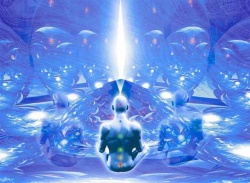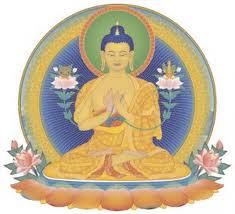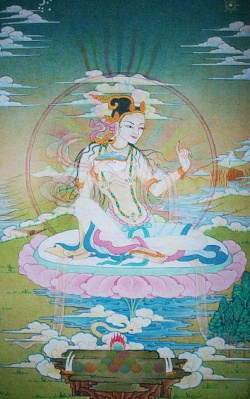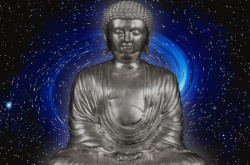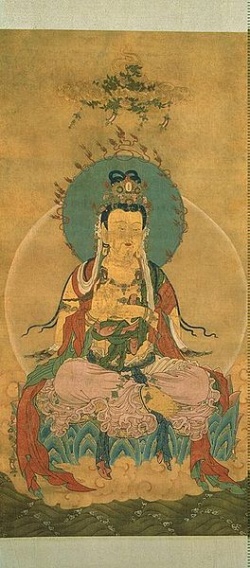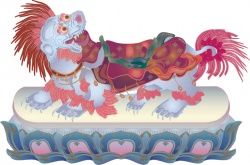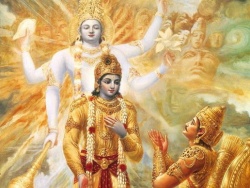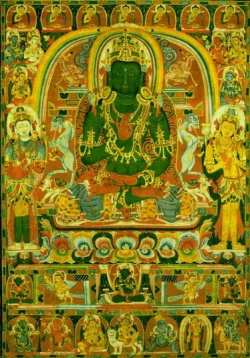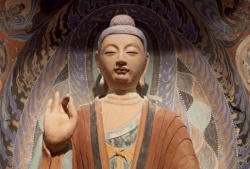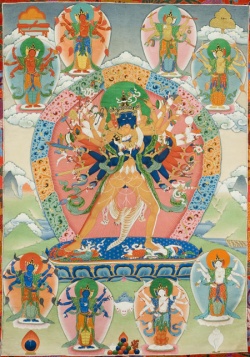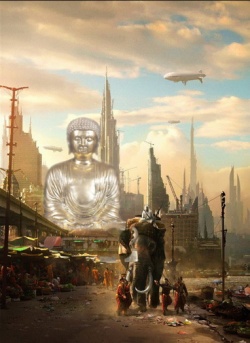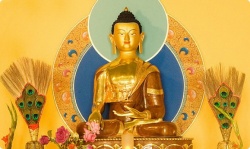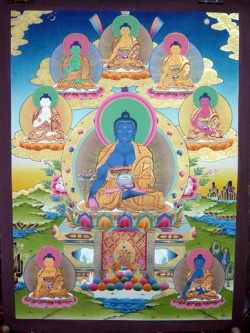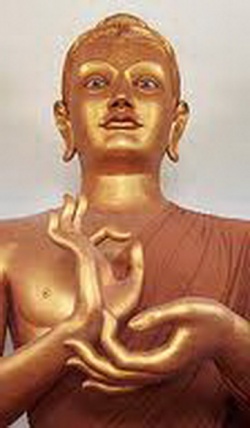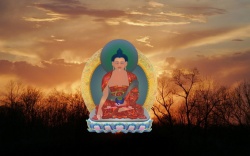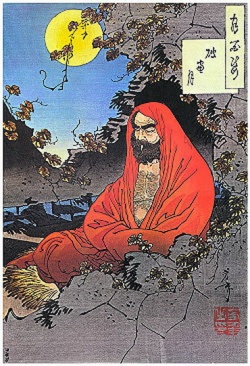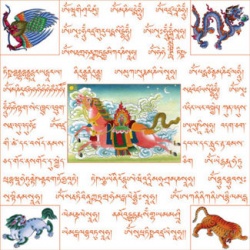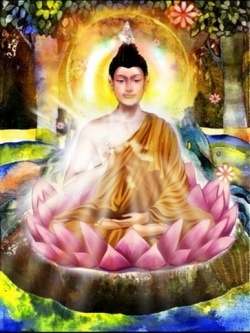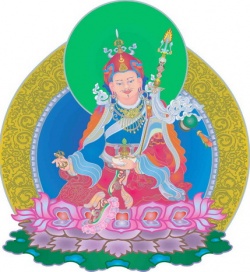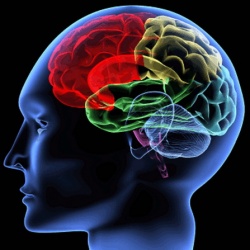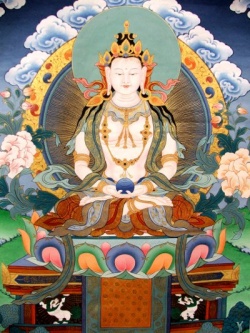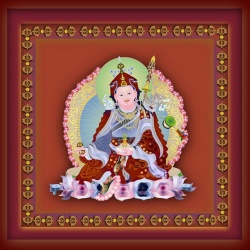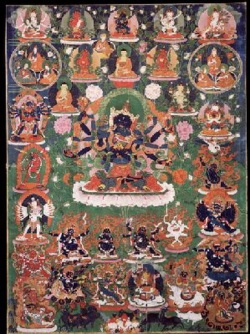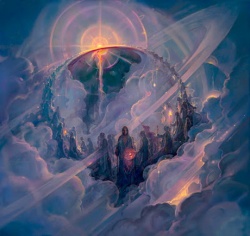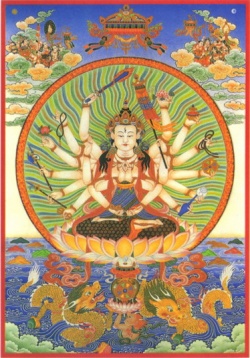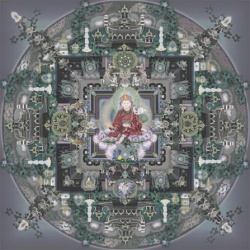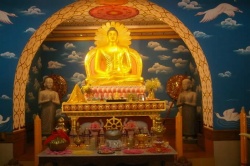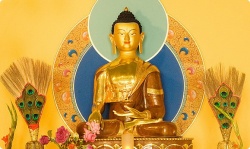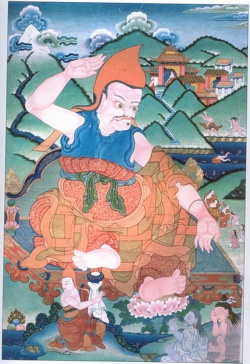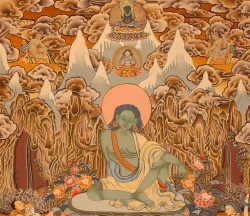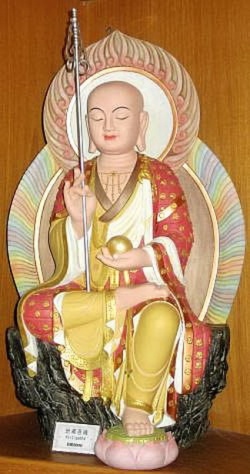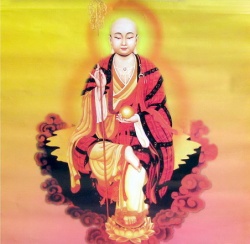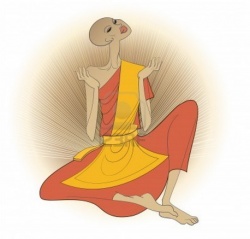Nirvana Sutra: Chapter Forty-One: On Bodhisattva Kasyapa (b)
Mahayana Mahaparinirvana Sutra
Translated by KOSHO YAMAMOTO
FROM Dharmakshema's Chinese version
The World's genuinely first-ever web edition of this complete scripture
(This "Yamamoto/page edition" is Copyright of Dr. Tony Page, 2004 )
The Complete Kosho Yamamoto English Translation of the "Nirvana Sutra", edited and revised by Dr. Tony Page, typographically improved by Jay and Gabriele Mazo
Chapter Forty-One: On Bodhisattva Kasyapa (b)
"O good man! Such matters of dispute are the things that belong to the world of the Buddha. They are not what sravakas and pratyekabuddhas can fathom. If a person can indeed gain a doubting mind, such a person can crush out innumerable defilements, as great in size as Mount Sumeru. When a man gains an immovable mind, this is what we call clinging."
Bodhisattva Kasyapa said to the Buddha: "O World-honoured One! How do we cling?"
The Buddha said: "O good man! Such a person may well follow what others say or look into the sutras by himself. Or he may particularly teach others, but such a person is unable to abandon what the mind sticks to. This is clinging."
Kasyapa said: "O World-Honoured One! Is such clinging an act of good or one that is not good?"
"O good man! Such clinging is not an action that can be called good. Why not? Because such cannot break all the webs of doubt."
Kasyapa said: "O World-Honoured One! Such a person had no doubt from the very start. How can we say that he cannot break the webs of doubt?"
"O good man! One who has no doubt is one who has doubt."
"O World-Honoured One! There is a person who says that one at the stage of srotapanna does not fall into the three unfortunate realms. The situation of this person may well be called one of clinging and doubt."
"O good man! This may well be called what is fixed; we cannot call it doubt. Why not? O good man! For example, there is a man who first sees a man and a tree and, later, while out walking at night, may see a stub (tree-trunk) and gain doubt and wonder if this is a man or a tree. O good man! A person first sees a bhiksu and a Brahmacarin, and then might later see, far off, a bhiksu and gain doubt and wonder if this is a sramana or a Brahmacarin. O good man! A person may first see a cow and a buffalo and later may see, in the distance, a cow and gain a doubting mind and wonder whether this is a cow or a buffalo.
"O good man! All beings first see two things and then gain doubt. Why? Because the mind is not clear. I never say that a person of the srotapanna stage falls into the three unfortunate realms or that he does not fall into the three unfortunate realms. How can a person gain a doubting mind?"
Kasyapa said: "O World-Honoured One! You the Buddha say that one necessarily sees a thing before and that then a doubt arises. There is one who, not seeing two things, gains doubt. What is this? It is Nirvana. O World-Honoured One! For example, a person runs into muddy water along the way. Not having seen anything of this kind before, a doubt arises. The case is thus. Is such water deep or shallow? Why is it that this person, not having seen (such) before, gains such doubt?"
"O good man! Nirvana is nothing other than the segregation of suffering; non-Nirvana is suffering. All beings see two things, which are: suffering and non-suffering. The suffering and non-suffering are: hunger and thirst, cold and heat, anger and joy, illness and peace, old age and the prime of life, birth and death, bondage and emancipation, love and parting, and encountering hateful people. Beings, having met (with these things), gain doubt: "Could there be any way to do away with all such things or not?" Because of this, beings entertain doubt as to Nirvana. You say that this person has not seen any water before, and how, you ask, is it possible for him to gain doubt? Things are not thus. Why not? This person has seen water before in other places. That is why he gains doubt where he has not seen it before."
"O World-Honoured One! This person has seen deep and shallow places before and then he had no doubt. Why does he now gain doubt?"
The Buddha said: "As he did not do before, he gains a doubt. That is why I say: "A person doubts when there is what is not clear."
Bodhisattva Kasyapa said to the Buddha: "O World-Honoured One! The Buddha says that a doubt is clinging and clinging a doubt. Who does such?"
"O good man! It is the icchantika, who has severed the root of good."
Kasyapa said: "O World-Honoured One! Who is the person who has severed the root of good?"
"O good man! Any person who is clever, cunning, sharp-witted, and who understands well but leaves a good friend. All people such as those who do not give ear to Wonderful Dharma, who do not think well, who do not live following Dharma are those who have severed the root of good. The mind parts from four things and the person thinks to himself: "There cannot be dana. Why not? Dana is parting with wealth. If there is any return to dana, the danapati (giver) will always be poor. Why? The seed and the fruit are alike. That is why we say that there is no cause and no result." If a person speaks thus and says that there are no cause and result, this is severing the root of good. Also, a person thinks: "The three elements of giver, recipient, and thing given do not abide eternally. If there is no abiding, how can one say that this is the giver, this the recipient, and this the thing given? If there is none who receives, how can there be any fruition (result)? For this reason, we say that there is no cause, and no result." Should a person say that there are no cause and no result, we can know that such a person has severed the root of good.
"Also, a person thinks: "When a person gives, there are five things in this giving. When he has received, the recipient may at times do good or non-good. And the giver of this giving also does not gain any result of good or non-good. This is as things go in the world, where the seed calls forth fruit and the fruit the seed. The cause is the giver and the result the recipient. And the recipient cannot make the good and non-good come into the hands of the giver. Because of this, there is no cause and no result." If a person should say that there is no cause and there is no result, know that this person truly severs the root of good.
"Also, a person thinks: "There is nothing that can truly be called dana. Why not? Dana is a thing which is indefinable. If indefinable, how can it call forth any good result? There is no result that is good or bad. This is what is called indefinable. If a thing is indefinable, know that there cannot be any good or bad result. For this reason, we say that there is no dana, no cause, and no result." Anyone who professes that there is no cause and also no result, such a person severs the root of good.
"Also, a person may think: "Dana is will. If will, there can be no seeing and no object seen. This is no matter (physical form). If no matter, how can a person give? Because of this, I say that there is no dana, no cause, and no result." If a person speaks like this and says that there is no cause and no result, know that this person truly severs the root of good.
"Also, a person might think: "If the giver gives to an image of the Buddha, that of a deva, or for the good of his parents who have now gone, there cannot be anyone who can be said to receive. If no one receives, there cannot be any result to name. If there is no result to name this means that there is no cause. If there is no cause, this means that there is no result." If a person talks thus and says that there are no cause and result, such a person severs the root of good.
"Also, a person thinks: "There is no father and no mother. Should a person say that parents are the cause of a being, the ones who bring forth a being, logic will lead him to say that birth must be going on continuously and that there is no disruption (interruption). Why? Because there is always the cause. But birth does not go on all the time. Because of this, know that there are no parents."
"Also, a person thinks: "There is no father and no mother. Why not? If a being comes about through parents, the being must possess the two sexual organs of male and female. But there are not such. Know that a man does not come about from parents."
"Also, a person thinks: "A being does not come from father and mother. Why not? One sees with one's eyes that one is not like one's parents in all such things as body and mind, deportment, one's goings and comings. Because of this, the parents are not the cause of the being."
"Also, a person thinks: "There are four nothingnesses. These are: 1) what has not appeared is what is not. This is like the horns of a hare or the hair of a tortoise (i.e. non-existent). It is the same with the parents of a being. These four are what are equal to what is not. One may say that the parents are the cause of the being. But when the parents die, the children do not necessarily die. Because of this, the parents are not the cause of the being."
"Also, a person thinks: "If we say that the parents are the cause of the being, beings must always come about from parents. But there are such births as the transformed birth and birth from moisture. From this we can know that the being does not come about from parents."
"Also, a person thinks: "A person can grow up, not depending upon his parents. For example, the peacock gains its body by hearing the sound of thunder, and the blue sparrow gains its body by swallowing the tears of the male sparrow; the jivamjivaka gains its body by looking at a brave man who dances." When the person thinks thus and does not encounter a teacher of the Way, that person, we may know, truly severs the root of good.
"Also, a person thinks: "In all the world, there is no karmic result from the good or bad actions performed. Why not? There are beings who are perfect in the ten good things and are pleased to give and amass virtues. Even to such persons there also truly come illnesses of the body; they can die in mid-life, lose their wealth, and have many apprehensions and sufferings. There is a person who commits the ten evil deeds, is parsimonious, greedy, jealous, lazy, and indolent. Never amassing good, he is yet at peace, has no illnesses, enjoys a long life, is full of wealth, and suffers no apprehensions or sorrow. From this we may know that there do not exist any karmic consequences from good and evil actions."
"Also, a person thinks: "I also once heard a holy man speak, who said that there are cases where a person who has accumulated good falls into the three unfortunate realms when his life ends, and cases where the evil-doer gains life in heaven when his life comes to an end. From this we can know that there cannot be any talk of results from good or evil actions."
"Also, a person thinks: "All holy persons say two (contradictory) things. One says that harming life gains one a good result, and (another says) that killing earns one an evil result. From this we may know that what a holy person says is not definite. If there is nothing definite in what a holy person says, how can one be definitely fixed? For this reason, know that there is no result from good or evil."
"Also, a person thinks: "There are no holy persons in the world. Why not? Any holy person will have the Right Way. All beings, possessed of defilement, practise the Right Way. Know that this means that they walk the Right Way and that defilement accompanies them. If the two exist at the same time, this means that the Right Way is unable to destroy defilement. If a person practises the Way, possessing no defilement, what is the good of practising the right Way? This indicates that any person who has no defilement cannot make away with the Way. If a person does not possess defilement, there is no need of the Way. From this, know that there cannot be anyone in the world who can be called a holy person."
"Also, a person thinks: "Ignorance is causally related to action, down to birth, old age, and death. Beings are all equally related to the 12 links of interdependence. The nature of the Noble Eightfold Path is equal, which is also so related. If one person practises, all beings will also gain; when one person practises, all the sorrows (of others) will die out. Why? Because defilement is equal in nature. And yet, we do not get this. This shows that there is no Right Way."
"Also, a person thinks: "Holy persons depend on the law (i.e. depend on the same things as) of any common mortal, as in drink and food, walking, standing, sitting, and lying, drowsing, being happy, laughing, feeling hunger and thirst, cold and heat, apprehension and fear. If on the same level, holy persons cannot attain the Holy Way. On attaining the Way, all these things must be done away with. If such things are not yet done away with, we may know that there cannot be any such thing as the Way."
"Also, a person thinks: "A holy person's body is immersed in the pleasures of the five desires. Also, he speaks ill of (people), beats (them), and is jealous and arrogant. He has sorrow and joy, and does good and evil deeds. From this we can know that there is no such thing as a holy person. If there is the Way, there must be the cutting off of the Way. If it is not cut off, we may know that there is no such thing as the Way."
"Also, a person thinks: "A person who has much pity is a holy person. Why do we call him a holy person? Because of the Way. If the Way is pity, he must have pity for all beings. It is not something one gains through having practised. If there is no pity, how can a holy person gain it when he has accomplished the Way? From this we may know that there is no such thing in the world as the Holy Way."
"Also, a person thinks: "All things do not arise having the four great elements as their cause. Beings all equally possess the four great elements. Beings see that this person may gain and the other may not. If there is any Holy Way, things should go thus. But things do not go thus. So one can indeed know that there is no such thing as the Holy Way."
"Also, a person thinks: "If all holy persons have only one Nirvana, we can know that there cannot be any such thing as a holy person. Why not? Because one cannot gain it. The eternal Dharma cannot be gained, or one cannot gain or abandon it. If holy persons have many Nirvanas, this tells us that what there is there is non-eternal. Why? Because these are things that can be counted. If Nirvana is one, it will come to everybody when one person gains it. If Nirvana is many, it must possess boundary lines. How can we call it eternal? If it is said that Nirvana is one in body and that emancipation is many, this may be likened to the case where one has many teeth and a tongue. But this is not so. Why not? Because each gaining is not total gaining. As there is a boundary line, it must be non-eternal. If non-eternal, how can one speak of Nirvana? If there is no Nirvana, how can there be any holy person? Due to this, we can know that there is no one who can be called a holy person."
"Also, a person thinks: "The Way that must be gained by any holy person is not what can be gained through causal relations. If it cannot be gained through causal relations, why do we all become holy persons? If all people are not holy persons, we can know that there cannot be any holy person or Way."
"Also, a person thinks: "The holy person says that there are two causal relations regarding right view, namely: 1) following others and giving ear to Dharma, and 2) thinking for oneself. If these two come about by causal relations, what comes about must also arise out of causal relations. Thus, there must be going on an unending chain of wrongs. If these two do not come about by causal relations, why is it that all beings do not get it?" So thinking, the person truly severs the root of good.
"O good man! If a person should thus profoundly view all things as causeless and resultless, that person cuts himself off from the root of the five things, which begin with faith. O good man! The person who lacks the root of good is not necessarily one of the mean and dull; nor is he in heaven or in the three unfortunate realms. It is the same with the bhiksu who infringes the law of the Sangha."
Bodhisattva Kasyapa said to the Buddha: "O World-Honoured One! When does such a person come back and gain the root of good?"
The Buddha said: "O good man! Such a person gains the root of good at two times. One is when he first enters hell, and the other is when he gets out of hell. O good man! There are three kinds of good act, which are those of 1) the past, 2) the present, and 3) the future. As regards the past, the nature dies out of itself. The cause may go off, but the result does not yet ripen. For this reason, we do not say that the person cuts off the karmic result of the past. What cuts off the causes of the Three Times is what we say that we cut off."
Bodhisattva Kasyapa said to the Buddha: "O World-Honoured One! If we say that we sever the root of good when we sever the cause of the Three Times, we may infer that the icchantika has the Buddha-Nature. Is such Buddha-Nature that of the past or is it that of the present or of the future? Or is it extended over all the Three Times? If it is of the past, how can we call it eternal? The Buddha-Nature is eternal. From this, we can know that it does not belong to the past. If it is of the future, how can we call it eternal? Why does the Buddha say that all beings will definitely gain it? If a person will unfailingly gain it, how can we say that he severs? If it is of the present, how can it be eternal? Why is it that the person will decidedly see it?
"The Tathagata says that in the Buddha-Nature there are six kinds (aspects), which are: 1) the Eternal, 2) the True, 3) the Real, 4) the Good, 5) the Pure, 6) the Visible. If the Buddha-Nature exists even after the severing of the root of good, we cannot say that we sever the root of good. If there is no Buddha-Nature, how can we say that all beings possess it? If the Buddha-Nature is both "is" and "is-not", why does the Tathagata say that it is eternal?"
The Buddha said: "O good man! The Tathagata-World-Honoured One has four answers to all beings, which are: 1) a definite answer, 2) a discriminative answer, 3) a non-accorded answer, and 4) a left-out answer.
"O good man! What is a definite answer? When asked if an evil action calls forth a good or evil result, we say definitely that what comes about is not good in nature. The same is the situation with what is good. If asked whether the Tathagata is all-knowing or not, we definitely say that he is an all-knowing person. When asked if the Buddhist teaching is pure or not, we definitely say that it is pure. When asked if the disciples of the Buddha live in accordance with the rules, the answer will definitely be that they live in accordance with the rules set for them to live by.
"What is a discriminative answer? It is as in the case of the Four Truths that I speak about. What are the Four? These are: 1) Suffering, 2) Cause of Suffering, 3) Extinction, and 4) the Way to the extinction of suffering. What is the Truth of Suffering? It is so called because there are eight sufferings. What is the Truth of the Cause of suffering? It is so called because of the cause of the five skandhas. What is the Truth of Extinction? It is so called because of greed, ill-will and ignorance, which go all through. What is the Truth of the Way? The 37 elements of Enlightenment are called the Truth of the Way. This is a discriminative answer.
"What is the answer to what is asked? This is as when I say that all things are non-eternal. And a person asks: "O Tathagata-World-Honoured One! Why do you say non-eternal?" If this is asked, we answer: "The Tathagata says non-eternal because of the fact that things are created." The same is the case with the non-Self, too. This is as when I say that all things get burnt.
"Another person asks further: "Why does the Tathagata-World-Honoured One say that all gets burnt?" The answer to this would be: "The Tathagata says that all burn due to greed, ill-will, and ignorance."
"O good man! “The Tathagata's ten powers, four fearlessnesses, Great Loving-Kindness and Great Compassion, three remembrances, all kinds of samadhi such as the Suramgama Samadhi, etc., that come to a total of some 8 million-billion, the 32 signs of perfection, the 80 minor marks of excellence, all the samadhis such as the five-knowledge mudra, etc., whose number extends up to 3 million 5 thousand, all the samadhis such as the vajra-samadhi, etc., whose number reaches 4,200, and the samadhis of the expedients, which are innumerable, are the Buddha-Nature of this Buddha. In this Buddha-Nature, there are seven things, namely: 1) the Eternal, 2) the Self, 3) Bliss, 4) the Pure, 5) the True, 6) the Real, and 7) the Good”. These are discriminative answers.
"O good man! In the Buddha-Nature of the transformed bodhisattva that represents another person (Jap. “goshin”), there are six things, which are: 1) the Eternal, 2) the Pure, 3) the True, 4) the Real, 5) the Good, and 6) Little Seeing. These are discriminative answers.
"You asked before: "Is there any Buddha-Nature in the person whose root of good has been severed?" Also, there is the Buddha-Nature of the Tathagata; also, there is the Buddha-Nature of the body represented as of a different person. As these two hinder one's future, we may well call these "nothing". As one decidedly gains it, we may well call this "is". This is a discriminative answer.
"The Buddha-Nature of the Tathagata is not of the past, present or future. The Buddha-Nature of the body gained to represent a different person has present and future. When we see to some extent, we call it the present. When one has not fully seen it, we construe it as belonging to the future.
"In the days when the Tathagata had not yet attained unsurpassed Enlightenment, what there was was the Buddha-Nature of past, present and future, due to the fact that the Buddha-Nature stood as cause. But the result is not thus. There is a situation where things concern the Three Times, or one where the Three Times are not involved.
"With the body of the Bodhisattva who gains it for a different person, the Buddha-Nature is in the state of cause. So it has past, present and future. It is the same with the result, too. This is a discriminative answer.
"There are six kinds (elements) in the Buddha-Nature of the Bodhisattva at the level of the ninth stage, which are: 1) the Eternal, 2) the Good, 3) the True, 4) the Real, 5) the Pure, and 6) the Visible. When the Buddha-Nature is the cause, it has the three phases of past, present and future. The same applies to the result, too. This is a discriminative answer.
"There are five things relative to the Buddha-Nature of Bodhisattvas at the levels from the eighth down to the sixth stage, namely: 1) the True, 2) the Real, 3) the Pure, 4) the Good, and 5) the Visible. When the Buddha-Nature is the cause, it has past, present and future. So does it obtain with the result, too. This is a discriminative answer.
"In the Buddha-Nature of Bodhisattvas at the levels from the fifth down to the first stage, there are five things, which are: 1) the True, 2) the Real, 3) the Pure, 4) the Visible, and 5) the Good and the non-Good.
"O good man! The Buddha-Nature of categories five, six and seven is what will assuredly be gained by those who have severed the root of good. Hence, "is". This is a discriminative answer.
"There may be those who will say: "Those who have severed the root of good decidedly have the Buddha-Nature and they decidedly have no Buddha-Nature." This is a left-out answer."
Bodhisattva Kasyapa said: "O World-Honoured One! I have heard that an answer where no answer is given is called a left-out answer. O Tathagata! Why do you call such an answer a left-out one?"
"O good man! I do not say that leaving out and not answering is a left-out answer. O good man! Of this left-out answer, there are two kinds, namely: 1) one which hinders and checks, and 2) non-clinging. On this account, we say left-out answer."
Bodhisattva Kasyapa said to the Buddha: "O World-Honoured One! Why do you the Buddha say that the cause is past, present and future and the result past, present and future, and also that it is not past, present and future?"
The Buddha said: "O good man! Of the five skandhas, there are two kinds, namely: 1) cause and 2) result. The five skandhas of this cause have past, present and future, but it is also the fact that they are not past, present and future. O good man! All the bondages of ignorance and defilement are the Buddha-Nature. Why? Because they are the cause of the Buddha-Nature. From ignorance and action and from all the defilements arise the five skandhas of good. This is the Buddha-Nature. We gain the five skandhas of good up to unsurpassed Enlightenment. That is why I said before in the sutra: "The Buddha-Nature of the being is like milk which contains blood." Blood refers to all the defilements of ignorance and action, etc., and milk refers to the five skandhas of good. That is why I say: "From all the defilements and from all the five skandhas of good, one arrives at unsurpassed Enlightenment." Just as the body of beings is made up of pure blood, so does it obtain with the Buddha-Nature, too. The Buddha-Nature of the srotapanna and sakrdagamin class who have excised defilement to some extent is like milk (“ksira”); the Buddha-Nature of the anagamin is like butter (“dadhi”); that of the arhat is like fresh butter (“navanita”); that of those at the levels of pratyekabuddha up to the Bodhsiattvas of the ten stages is like clarified butter (“ghrta”); and the Buddha-Nature of the Buddha is like the skim of melted butter (“sarpirmanda”). O good man! The defilement of the present hinders, so that beings cannot see. In Gandhamadana, we come across the "ninnikuso". It does not mean that all cows can feed on it. It is the same with the Buddha-Nature. This is a discriminative answer."
The Buddha said: "O good man! All people did things in the past, the karmic results of which they are now living through in this life. There can be the actions of the future. As these Bodhisattva Kasyapa said to the Buddha: "O World-Honoured One! If the Buddha-have not yet come about, there is no result to speak of. People have defilement now. If not, all beings would have to be able clearly to see the Buddha-Nature. On this account, one who has severed the root of good indeed cuts off, with the causal relation of defilement of the present world, the root of good and, through the causal relation of the power of the Buddha-Nature of the future, can gain the root of good."
Kasyapa said: "O World-Honoured One! How might one gain the root of good in the future?"
"O good man! This is analogous to the day-lamp which can indeed dispel the gloom, even though the sun has not yet risen. This is just as the future can truly call forth beings. It is the same with the Buddha-Nature of the future. This is what we call a discriminative answer."
Bodhisattva Kasyapa said to the Buddha: "O World-Honoured One! If the five skandhas are the Buddha-Nature, why do we say that the Buddha-Nature of beings exists neither within nor without?"
The Buddha said: "O good man! How could you lose the meaning? Did I not say before that the Buddha-Nature of the being is none other than the Middle Path?"
Kasyapa said: "O World-Honoured One! I did not lose the meaning. As beings do not grasp the meaning of this Middle Path, I speak thus."
"O good man! Beings do not understand the Middle Path. At times they understand it, and at other times they do not. O good man! In order that beings can know, I say that the Buddha-Nature is neither within nor without. Why? Common beings say that the Buddha-Nature is the five skandhas, as though it were a vessel. Or they say that it exists outside of the skandhas as in the Void. That is why the Tathagata say Middle Path. The Buddha-Nature which beings possess is neither the six sense-organs nor the six sense-fields. Within and without come together. So we say Middle Path. That is why the Tathagata says that the Buddha-Nature is not other than the Middle Path. As it is neither within nor without, it is the Middle Path. This is a discriminative answer.
"Also, next, O good man! Why do we say neither within nor without? O good man! Some say that the Buddha-Nature is none but the tirthika. Why? In the course of innumerable kalpas, the Bodhisattva-mahasattva, being amidst tirthikas, has cut away all defilements, trained his mind, taught people, and then gained unsurpassed Enlightenment. On this account, the Buddha-Nature is none but the tirthika.
"Or a person might say: "The Buddha-Nature is no other than the Way within." Why so? The Bodhisattva may have practised the way of the tirthikas over the course of countless kalpas. But other than by the Way within, he would not be able to attain unsurpassed Enlightenment. That is why the Buddha-Nature is what the Buddha taught. For this reason, the Tathagata checks off the two planes and says: "The Buddha-Nature is neither inside nor outside. It is an inside-and-outside. This is the Middle Path." This is a discriminative answer.
"Also, next, O good man! Some say: "The Buddha-Nature is none other than the Adamantine Body of the Tathagata and the 32 signs of perfection and the 80 minor marks of excellence. Why? It is nothing that is false."
"Or a person might say: "The Buddha-Nature is no other than the ten powers, the four fearlessnesses, Great Loving-Kindness and Great Compassion, the three remembrances, all kinds of samadhis, such as the Suramgama Samadhi, etc. Why? Because by means of samadhi, one gains the Adamantine Body, the 32 signs of perfection, and the 80 minor marks of excellence." Because of this, the Tathagata checks off the two planes and says that the Buddha-Nature is neither inside nor out; it is both in and out. This is the Middle Path.
"Also, next, O good man! Some say: "The Buddha-Nature is the good thinking of the Way within. Why? Apart from good thinking, one cannot attain unsurpassed Bodhi. Thus, the Buddha-Nature is the good thinking of the Way within."
"Or some say: "The Buddha-Nature hears Dharma, following others. Why? To hear Dharma gives one good thinking of the Way. If one does not give ear to Dharma, this is no thinking. Thus, the Buddha-Nature is to hear Dharma, following others." On this account, the Tathagata checks off the two planes and says that the Buddha-Nature is neither within nor without; and also it is both within and without. This is the Middle Path.
"Also, next, O good man! Some say: "The Buddha-Nature is what is without. It refers to danaparamita. Through danaparamita, one attains unsurpassed Bodhi. Because of this, we say that danaparamita is the Buddha-Nature." Or a person says: "The Buddha is the Way within. This refers to the five paramitas. Other than these five things, there cannot be - we should know - any cause or result of the Buddha-Nature." On this account, the Tathagata checks off the two planes and says: "The Buddha-Nature is neither within nor without. It is both within and without. This is the Middle Path."
"Also, next, O good man! A person says: "The Buddha-Nature is the Way within. For example, it is like the mani (jewel) on the forehead of the wrestler. Why? Because the Eternal, Bliss, the Self, and the Pure are like manis. Because of this, we say that the Buddha-Nature is within." Or some say: "The Buddha-Nature is without. It is like the treasure trove of the poor man. Why? Because one sees it through expedients. It is the same with the Buddha-Nature, too. It exists outside of beings. By effecting an expedient, one can see it." Because of this, the Tathagata checks off the two planes and says that the Buddha-Nature exists neither within nor without; it is also both within and without. This is the Middle Path.
"O good man! The Buddha-Nature of beings is not "is" and is not "not-is". Why so? The Buddha-Nature is "is", but it is not as in voidness. Because even when effecting innumerable expediencies, the voidness that we speak of in the world cannot be seen. But the Buddha-Nature can be seen. Because of this, though it is "is", it is not like voidness. The Buddha-Nature is "not-is", but it is not as with the horns of a hare (i.e. it is not that it does not exist). Why? Even with innumerble expedients, the hair of a tortoise and the horns of a hare cannot come about. The Buddha-Nature can come about. So, though "not-is", it is not the same as the horns of a hare. So, the Buddha-Nature is neither "is" nor "not-is"; it is "is" and "not-is".
"Why do we say "is"? All is "is". Beings do not get cut off and do not die out. This is like the flame of a lamp, until one attains unsurpassed Bodhi. So, we say "is".
"Why do we say that it is "not-is"? All beings are, for the present, not the Eternal, Bliss, the Self, and the Pure, and do not possess the Buddhist teaching. Hence, "not-is". As "is" and "not-is" become one, we say Middle Path. That is why the Buddha says that the Buddha-Nature of the being is neither "is" nor "not-is".
"O good man! If a person should ask: "Is there a fruit in this seed or not?", answer definitely: "It is either "is" or "not-is". Why? Without the seed, we cannot gain the fruit. Hence, we say "is". The seed does not yet have any bud. Hence, "not-is". Because of this, we say either "is" or "is-not". Why? Although there exists the difference of time, the body is one. The same is the case with the Buddha-Nature of the being. “If one says that in the being there is a separate Buddha-Nature, this is not so. Why? Because the being is the Buddha-Nature, and the Buddha-Nature is the being. Through difference in time, we have the difference of the Pure and the non-Pure” (emph. added).
"O good man! If a person asks: "Can this seed definitely call forth fruit, or can this fruit truly call forth a seed?", answer definitely: "It either calls forth or it does not."
"O good man! Worldly people say that there is cream in milk. What might this imply? O good man! If a person says that there is cream in milk, this is nothing but clinging; if a person says: "there is no cream", this is what is false. One comes away from these two planes and says definitely: "It is either "is" or "not-is."
"Why "is"? Because we gain cream from milk. The cause is the milk and the result is the cream. Because of this, we say "is".
"Why do we say "not-is"? The thing and the taste differ and the use is not one (i.e. not the same). For fever we use milk, and for loose bowels cream. Milk calls forth a cold, whereas cream fever.
"O good man! A person might say that there is in milk the nature of cream. If so, milk is cream and cream milk. The nature is one.
"Why is it that milk comes out first and not cream? If there is the causal relation to speak of, why is it that all beings do not so speak of it? If there is no causal relation, why is it that cream does not come out first? If cream does not come out first, who is it that has made the order of: milk, cream, fresh butter, clarified, butter, and the skim of melted butter? From this, we know that cream was not before, but is now. If it was not before, but is now, this is something non-eternal.
"O good man! A person might say that as there is the nature of cream in milk, cream does indeed come forth; as there is the nature of cream, cream does not come about from water. But the case is not so. Why not? For even watery grass, too, has the nature of milk and cream. How so? From watery grass we gain milk and cream. If a person says that in milk there is decidedly the nature of cream and that there is not in watery grass, this is something false. Why? Because the mind is unequal (because the person is being inconsistent). Hence, false.
"O good man! If we say that there is decidedly cream in milk, there must surely be the nature of milk in cream. Why? From milk comes about cream, and cream does not call forth milk. If there is no causal relation, we should know that this cream is what originally was not, but now is. Because of this, the wise will say that it is not that there is the nature of cream in milk and it is not that there is not the nature of cream in milk.
"O good man! Because of this, the Tathagata says in this sutra: "If one says that all beings decidedly have the Buddha-Nature, this is clinging; if one says that they do not have it, this is what is false." The wise will say: "The Buddha-Nature of the being is either "is" or "not-is".
"O good man! When four things harmonise (i.e. conjoin together), visual consciousness comes about. What are the four? They are: the eye, the thing, brightness (light), and desire. The nature of this visual consciousness does not exist in the eye, nor in the thing, nor in brightness, nor in desire. Through conjoining, it comes about. Thus, visual consciousness is what originally was not but now is, and what once was and what again is not. Hence, we have to know that there is no fixed nature. It is the same with the nature of cream in milk, too.
"If a person should say: "Water does not call forth cream, as it does not possess the nature of cream. Thus, there is decidedly the nature of cream in milk" - this is not so. Why not? All things have different causes and different results. Also, it is not that a single cause calls forth all results; it is not that all results come from a single cause.
"O good man! Do not say that thus four things call forth visual consciousness and from these four things comes about auditory consciousness.
"O good man! Departing from the (necessary) expedient methods, one cannot gain cream from milk, or fresh butter from cream. What is definitely needed is the expedient means.
"O good man! The wise person sees that cream comes from milk, but will not say that fresh butter will also thus come forth, other than through expedient means. O good man! That is why I say in this sutra: "When the cause has come about, a thing comes about; when the cause is absent, there is no thing."
"O good man! The nature of salt is salty. It truly makes what is not salty (taste) salty. If there were already a salty nature in what is not salty, why would people continue to seek to possess salt? If there were no saltiness before, then that would be (a case of) what was not becoming so now. By the help of the (right) condition, we get saltiness. All things possess the nature of saltiness, but we do not feel this, on account of the smallness of the amount. This smallness in nature makes things salty. If there were not this salty nature, even salt could not bring forth (the quality of) saltiness.
"A seed, for example, has by itself the quality of the four great elements. From the four great elements other than those of itself, the bud, the stem, the branch and the leaf can grow. It is the same with the nature of saltiness. So do they say. But this is not so. Why not? If it is the case that what is not salty possesses a salty nature, this is tantamount to saying that salt, too, must have the nature of non-saltiness, even if to the smallest degree. If this salt thus has two natures, why is it that it cannot be separately used, other than what is not salty? Hence, we know that salt does not originally possess two natures. As with salt, so is it with all other things which are not salty. A person might say that the seeding power of the four great elements that exists outside truly enhances that of those inside. This is not so. Why not? As things are stated in an orderly way, this does not follow the expedient means. From milk, we get cream. But things do not proceed thus with fresh butter and all other things. There is no going through the expedient means. It is the same with the four great elements. One might say that the four great elements that are within get augmented by those from outside. But we do not see the four great elements of the outside world getting augmented by the four great elements of the inside world. The fruit, sirsa, has no definite form beforehand. When it sees the krttika, the fruit comes about, gaining a size of five inches. This fruit does not get its size from what obtains in the four great elements outside of the fruit itself.
"O good man! I have delivered the sermons of the 12 types of sutra of my own will, or following the will of others, or following my own will and also that of others.
"What do I mean by saying that I speak of my own free will? 500 bhiksus put a question to Sariputra: "O great one! The Buddha speaks about the cause of the body. What might this be?" Sariputra said: "O great ones! When you yourselves gain Right Emancipation, you yourselves will know. Why do you pose such a question?" A bhiksu answered: "O great one! At the time when I had not yet attained Right Emancipation, I thought that ignorance was the cause of the body. As I so thought to myself, I gained arhatship." One person said: "O great one! When I had not yet attained Right Emancipation, I thought to myself that ignorance and craving were the cause of the body. As I so thought to myself, I attained the fruition of arhatship." And some said: "Things such as action, consciousness, mind-and-body, the six spheres, touch, feeling, craving, cleaving, existence, birth, food and drink, and the five desires are the cause of the body." Then all the 500 bhiksus, each saying what he understood, went to the Buddha, touched his feet, circumambulated him three times, paid him homage, drew back to one side, and each reported what he had in his mind to the Buddha.
"Sariputra said to the Buddha: "O World-Honoured One! Of all these persons, who is the one who speaks in the right way? And who is not right?"
"The Buddha said to Sariputra: "Well said, well said! Each bhiksu says nothing but what is right."
"Sariputra said: "O World-Honoured One! What is it that is in your mind?"
"The Buddha said: "O Sariputra! I said for the sake of beings that parents are the cause of the body. The case is thus. All such sutras are what I spoke of my own free will.
"What are those which I spoke following the will of others? The rich man, Patala, came to me and said: "O Gautama! Do you know a phantom or not? One who knows phantoms is a great phantom. If not, such a person is no All-Knower."
"I said: "O rich man! How can you call one who knows a phantom a phantom?"
"The rich man said: "Well said, well said! One who knows a phantom is a phantom."
"The Buddha said: "O rich man! There was a candala in the state of King Prasenajit, in Sravasti, whose name was Baspacandala. Have you heard of him or not?"
"The rich man said: "I have known him for a long time already."
"The Buddha said: "If you have known him for a long time, might it be that you are (yourself) a candala?"
"The rich man said: "I have known him for a long time already, but this body of mine cannot be that of a candala."
"O you rich man! You now know that though you know a candala, you are not a candala. How can it be that I am a phantom because I know a phantom? O rich man! I truly know a phantom, one who acts as a phantom, the results of the phantom, and the arts of the phantom. I know killing, the killer, the karmic results of killing, and emancipation from killing. I also know twisted views of life, the people of twisted views, the karmic results of twisted views, and emancipation from twisted views. O rich man! Should you call one who is not a phantom a phantom, and one who does not hold twisted views of life one who is possessed of twisted views of life, you will gain innumerable sins."
"The rich man said: "O Gautama! If things are as you say, I shall earn great sin. I shall now give you all that I possess. Please be good enough not to have King Prasenajit informed of this."
"The Buddha said: "It cannot necessarily be that the causal relations of this sin will prevent you from losing your wealth. In consequence of this, you will fall into the three unfortunate realms."
"On hearing mention of the unfortunate realms, the rich man became frightened and said to the Buddha: "O Holy One! I have now lost my head and committed a great sin. You Holy One are the All-Knower! You must know how to get emancipated. How am I to evade the worlds of hell, hungry ghosts, and animals?"
"I then spoke to him of the Four Truths. The rich man, on hearing this, attained the fruition of srotapanna. Repentance had budded, and he begged the pardon of the Buddha: "I was ignorant. I said that the Buddha was a phantom, despite the fact that you are not. I shall, from this day forward, take refuge in the Three Treasures."
"The Buddha said: "Well said, well said, O rich man!" The case is thus. This is speaking in response to the will of others.
"How do I speak following my own will and that of others? When all the world says that the wise say "is", I too say "is". When they say that the wise say "is-not", I too say "is-not". When the wise of the world say that to amuse oneself in the five desires ends in the non-eternal, suffering, non-Self, and disruption, I, too, say so. When the wise of the world say that to amuse oneself in the five desires does not end in the Eternal, Self, and the Pure, I too say so. Things stand thus. This is what is called speaking following one's own will and also that of others.
"O good man! I said: "The Bodhisattvas of the ten levels see the Buddha-Nature somewhat." This is speaking following the will of others. Why do we say that one sees a little? The Bodhisattva of the ten stages gains the Suramgama and other samadhis and the 3,000 teachings (i.e. the teachings of the universe). Because of this, he clearly sees that all attain unsurpassed Bodhi. All beings will definitely gain unsurpassed Bodhi. That is why I say: "The Bodhisattva of the ten stages sees the Buddha-Nature somewhat."
"O good man! I always say: "All beings possess the Buddha-Nature." This is what I speak following my own will. All beings are not segregated, do not perish, and gain unsurpassed Bodhi. This is what I say following my own will.
"All beings have the Buddha-Nature. When defilement overspreads them, they cannot see it. That is what I say that is what you say. This is what is said following my own will and the will of others.
"O good man! The Tathagata, at times, speaks of innumerable teachings as just one thing. I say in the sutras that all pure actions arise out of the good teacher of the Way. This is how it goes. The causes of all pure actions are innumerable. But if we say "good teachers of the Way", this covers everything. This is as when I say that all actions arise out of evil views of life. The causes of all evil actions are innumerable. But when we say "evil views of life", this already covers everything. Or we say that unsurpassed Enlightenment has faith as its cause. The causes of Enlightenment are innumerable, but if stated as faith, this covers everything. O good man! The Tathagata speaks innumerable teachings, but these do not depart from the five skandhas, the 18 realms, and the 12 spheres.
"O good man! The Tathagata's words are - for the sake of the being - made up of seven kinds, i.e. those based on words of: 1) cause, 2) result, 3) cause and result, 4) metaphors 5) non-accorded words, 6) following what generally applies in the world, 7) one's own free will. Why cause? This speaks of the result that is to come about in the future from the cause that now exists. This is what I say.
"O good man! Do you see anyone who takes pleasure in killing or doing evil things? Know that such a person is destined for hell.
"O good man! If there is any person who does not take pleasure in killing or doing evil, know that such a person is a heavenly being. This is what is said based on (the subject of) cause.
"What are words based on "result"? This looks back to the cause from the result that is at hand. This is as is stated in the sutra: "O good man! The poverty-stricken beings that you come across look ugly in their faces, as though they did not have freedom. Know that those persons must have infringed the precepts, had a jealous, angry or restless mind. When we see people who possess many things and wealth, whose sense-organs are perfect and whose deportment possesses authority and unmolestedness (a sense of inviolability), we may know that such persons must definitely have upheld the moral precepts, given (to others), made effort, and possessed a repenting mind, had no jealousy, nor any mind of anger." This is what we call "words based on the result."
"What are cause-and-result words? This is as when it is stated in a sutra: "O good man! The six sense-organs which beings now possess arose from the cause of touch and are the results of the past. The Tathagata also speaks of this and calls it karma. The causal relations of this karma call forth the results that one has to harvest in the time to come." These are "words based on cause-and-result".
"What is a metaphor? For example, "lion-king" refers to me. Such terms as great elephant-king, great naga-king, parijata, ball of seven treasures, great ocean, Mount Sumeru, great earth, great rain, master mariner, guide, best trainer, wrestler, cow-king, Brahmin, sramana, great castle, and tala tree are metaphorical terms.
"What are non-accorded words? I say in a sutra: "Heaven and earth come into one; the river does not get into the sea; for the sake of King Prasenajit, mountains come from (all) around." It is as when I spoke to Mrgaramata, such as: "Even the sal trees would gain the bliss of humans and heaven if they received the eight precepts." The case is thus. I may even say that the Bodhisattvas of the ten stages have a retrogressing mind, but never will I say that the Tathagata employs two kinds of words. I might even say that a srotapanna might fall into the three unfortunate realms, but I will never say that the Bodhisattva of the ten stages has a retrogressive mind. These are non-accorded words.
"What are the words that apply in the world? These are such as the Buddha uses, such as: man and woman, big and small, to go and to come, to sit and to lie, vehicle and house, pot, clothing, beings, the eternal, bliss, self, and the pure, army, forest, castle-town, phantom, transformed existence, and to become one and to disperse. These are the words that obtain in the world.
"What are words that come forth as one wills? This is as when I reproach those who violate the prohibitions and I make them guard against this. I praise those of the srotapanna stage and enable common mortals to gain a good (state of) mind. I praise Bodhisattvas and enable common mortals to aspire to Enlightenment. I speak of the sufferings of the three unfortunate realms and cause people to do good. I say that all gets burnt, addressing those who are addicted to the notion that all things are created things. So does it go with the non-Self. We say that all beings possess the Buddha-Nature. All this is to cause all beings not to be indolent. These are the words that come out of one's free will.
"O good man! The Tathagata also possess words which come out of his own free will. There are two kinds (aspects) in the Buddha-Nature of the Tathagata, namely: 1) "is", and 2) "not-is". The "is" refers to: the 32 signs of perfection, 80 minor marks of excellence, ten powers, four fearlessnesses, three remembrances, Great Loving-Kindness and Great Compassion, such innumerable samadhis as the Suramgama Samadhi, etc., such innumerable samadhis as the vajra-samadhi, etc., such innumerable samadhis as of the expedients, etc., and such innumerable samadhis as of the five knowledges. These are all "is".
"Not-is" refers to all the Tathagta's good deeds of the past, the non-good, indefinables (i.e. neither good nor bad), karmic causes, karmic results, defilements, the five skandhas, the 12 links of interdependence, etc. These are the "not-is".
"O good man! There are the "is" and the "not-is", good and non-good, defiled and non-defiled, mundane and supra-mundane world, holy and non-holy, the created and the non-created, the real and the non-real, quietude and non-quietude, disputation and non-disputation, world and non-world, illusion and non-illusion, cleaving and non-cleaving, prophecy and non-prophecy, existence and non-existence, the Three Times and not the Three Times, time and non-time, Eternal and non-Eternal, the Self and the non-Self, Bliss and non-Bliss, the Pure and the non-Pure, form-feeling-perception-volition-consciousness, and non-form-non-feeling-non-perception-non-volition-non-consciousness, the six sense-organs and non-six sense organs, the six sense-fields and the non-six sense-fields, the 12 links of interdependent arising and the non-12 links of interdependent arising. These are the "is" and "not-is" of the Tathagata's Buddha-Nature. And the same applies to the Buddha-Nature of the icchantika.
"O good man! I say: "All beings possess the Buddha-Nature." But beings do not understand the words of the Buddha that accord with his own will. As such words cannot even be understood by the Bodhisattva personifying another person. How could the two vehicles and all other Bodhisattvas understand them?
"O good man! I, at one time at Grdhrakuta, discussed worldly truths with Maitreya. None of the 500 disciples, including Sariputra, knows of these, still less of the supramundane “Paramartha-satya” (Ultimate Truth). O good man! There are cases where the Buddha-Nature is with an icchantika and not with a person of virtue, or where it is with a person of virtue but not with an icchantika. Or it can be with both or not with both. O good man! Those of my disciples who know of these four cases should not criticise and say: "Is the Buddha-Nature definitely with an icchantika or not?" When it is stated: "Beings all possess the Buddha-Nature", this is to be called the Tathagata's words of his own will. How could beings understand this at all?
"O good man! This is comparable to a situation in which there are seven beings in the river Ganges. These are those who: 1) always get drowned, 2) come up for a time and then sink down again, 3) come up and stay there, 4) come up and look all around, 5) look all around and go (move), 6) get out and stay there again, 7) go (move about) both on land and water.
"We speak of one who always sinks. This means that the person undergoes the great evil karmic result of a big fish, so that his body is heavy and the place is deep. Hence, he always sinks.
"We speak of one who, for a time, comes up but sinks gain. This means that the person suffers from the evil karma of a big fish, so that his body is heavy and the place shallow, so that, for a time, he sees the light. By means of the light, he comes up for a time, but his body being heavy, he sinks again.
"We speak of one who, on coming up, remains there. This refers to the fish called “timi” (a kind of shark). It lives in shallow waters and enjoys the light. Hence, we say that it comes up and remains (there).
"We speak of one who comes up and looks all around him. This is the case of a shark which looks all around and seeks food. On this account, it looks around.
"We speak of one who, having seen, goes off. This means that the fish, having seen some other things far off, soon goes off after them in order to devour them. Hence, having seen, it goes off.
"We speak of one who, having gone, stays. This means that the fish goes off, and having eaten what it wanted to have, stays there. This is why we say that it goes off and then stays there.
"We speak of one who goes on both land and water. This refers to the tortoise.
"O good man! In this all-wonderful river of Nirvana, there live seven living beings. These are the first - always-sinking - up to the seventh. Some sink and some come up.
"We speak of one who always sinks. This refers to one who hears this said: "This Great Nirvana Sutra states that the Tathagata is Eternal, does not change, and is the Eternal, Bliss, the Self, and the Pure; that he does not ultimately enter Nirvana; that all beings possess the Buddha-Nature; that the icchantika, the slanderers of the vaiulya sutras, those who have committed the five deadly sins, those guilty of the four grave offences, will all perfect the Way to Enlightenment; that the srotapanna, sakrdagamin, anagamin, arhat, and pratyekabuddha will unfailingly achieve unsurpassed Enlightenment." On hearing this, such a person does not believe, but thinks to himself: "This Nirvana Sutra is one that belongs to the tirthikas and is not a Buddhist sutra." This person then departs from the Way, and does not give ear to Wonderful Dharma. At times, he may happen to hear (Dharma), but he cannot think well. He may think, but cannot think of good. As he does not think of good, he abides in evil. Abiding in evil has six ways, which are: 1) evil, 2) non-good, 3) defiled dharma (state), 4) augmentation of "is", 5) worry in heat (i.e. becoming hellishly hot with worry), 6) receiving evil results. This is to sink.
"Why is it to sink? When a person does not have a good (state of) mind, when he always does evil, when he does not practise the Way, we call this "sinking". We say "evil" because a holy person reproaches (him), the mind feels fear, good persons hate (this), and because there is no benefiting of beings. Hence, evil.
"We say non-good because innumerable evils come about, because ignorance always binds the person, because he is always intimate with evil people, because he does not practise all the (various) kinds of good, because his mind is always inverted and always goes wrong. Hence, non-good.
"We say "defiled dharma" because it always defiles body and mouth, because it defiles pure beings, because it increases non-good actions, because it keeps the person away from good things. Hence, defiled dharma.
"We speak of augmenting "is" because what is done by the three persons mentioned above truly increases the causes for hell, hungry ghosts, and animals. Such a person does not practise Dharma for Emancipation. He does not scorn the actions of body, mouth and mind, and all others. This is to augment "is".
"We speak of "worrying heat" because this person minutely (constantly) does such four things and makes the body and mind feel worried over the two things, and there is no time for quietude. This is "heat". This ends in the karmic consequence of hell. Hence, heat. This burns all beings. Hence, heat. This burns all good things. Hence, heat. O good man! This person does not possess faith and coolness. Hence, heat.
"We speak of suffering from evil results. This person fully does all the five things stated above, and after death falls into the realms of hell, hungry preta, and animals.
"O good man! There are three evil things through which one suffers evil results, namely: 1) the evil of defilement, 2) the evil of karma, 3) the evil of karmic returns. O good man! As this person possesses the above-quoted six things, he cuts himself off from the root of good, commits the five deadly sins, performs the four grave offences, slanders the Three Treasures, uses the things which belong to the Sangha, and does all kinds of non-good. Because of these causal relations, he sinks into Avichi Hell and receives a body 84,000 yojanas wide and broad. The sin of his actions of body, mouth and mind being grave, the person cannot extricate himself from suffering. Why not? Because his mind cannot call forth anything good. Innumerable Buddhas may come into the world, but such a person will not give ear to them or see them. Hence, we say that he forever sinks. This is as with the big fish in the river Ganges.
"O good man! I say: "The icchantika is one who eternally sinks, but there are icchantikas who do not fall within the class of those who eternally sink." Who are such? This is as in the case where, for the sake of "is", the person practises giving, sila (morality), and good. This is one who is eternally sunk.
"O good man! There are instances where four good things call forth evil results. What are the four? They are: 1) reading and reciting the sutras so as to come above others, 2) upholding the prohibitions and precepts for the sake of profit, 3) giving because one belongs to others, 4) setting one's mind on, and meditating for the sake of gaining, the thoughtlessness-and-non-thoughtlessness state of mind. These four evoke evil results. That is why we say of one who practises and amasses such that he sinks and comes up again. Why do we say he sinks? Because he enjoys the three existences (i.e. the kamadhatu, rupadhatu, and arupadhatu - worlds of desire, form, and non-from). Why do we say he comes up? Because he sees the light. The light corresponds to his hearing (Dharma), upholding the silas, giving, and sitting in meditation.
"Why do we say that the person sinks? Because he gains in evil views and acquires arrogance. Hence, I say in the sutra:
"If beings seek all existences
And do good and evil deeds for existence,
Such persons will lose the way to Nirvana.
This is why we say that
The person temporarily comes up but sinks again.
He sails on the dark ocean of birth and death,
He may gain Emancipation
And do away with defilement.
But the person again suffers from evil returns.
This is temporarily coming up
Only to sink again."
"O good man! This is as in the case of the big fish that comes out of the water for a time when it sees the light, but, as its body is heavy, sinks down again. That is how things also proceed with the two persons mentioned above.
"O good man! And there is a person who clings to, and takes pleasure in, the three existences. This is sinking. He hears the Great Nirvana Sutra and gains faith. This is coming up.
Why do we say coming up? When the person hears this sutra, he does away with evil and practises good. This is coming up. The person believes, but is not perfect. Why is he not perfect? The person believes in Mahaparinirvana and the Eternal, Bliss, the Self, and the Pure, but says that the Tathagata's body is non-Eternal, non-Bliss, non-Self, and non-Pure.
"The Tathagata has two Nirvanas. One is the created, and the other is the uncreated. With created Nirvana, there are no Eternal, Bliss, Self, and the Pure. A person may believe that beings possess the Buddha-Nature, but not that all beings have it. So we say "not perfect in faith".
"O good man! There are two kinds (aspects) of faith: one is believing, and the other seeking. Such a person possesses faith, but does not push on and seek. Hence, not perfect in faith.
"There are also two phases of faith. One (type of faith) arises from hearing, and the other from thinking. The faith of this person arises from hearing, not from thinking. Hence, not perfect in faith.
"Also, there are two kinds. One (kind) believes in the fact that there is Enlightenment, and the other (kind of faith believes that there are) people who have gained it. Hence, not perfect in faith.
"Again, there are two kinds. One is belief in what is right, and the other in what is evil. A person says that there are cause and result and the Buddha, Dharma, and Sangha. This is believing in what is right. A person says that there cannot be any such things as cause and result and that the Three Treasures are different in nature. The person believes in evil words and the Puranas. This is believing in evil. The person believes in the Buddha, Dharma, and Sangha, but does not believe that the Three Treasures are one in nature and characteristics. He believes in cause and result, but does not believe that there is anyone who has gained (Enlightenment). Hence, not perfect in faith. This person is not perfect in faith and does not observe the prohibitions and the precepts. Why do we say not perfect? Being not perfect, the sila (the moral precepts) which one has received is not perfect. And why does one say not perfect?
"Of sila, there are two kinds, namely: 1) sila aimed at deportment and 2) sila for sila's sake (i.e. sila observed not as a matter of form). The person upholds the sila for deportment, but not the sila for sila's sake. Hence, not perfect in sila.
"Also, there are two kinds, which are: 1) one that is purported and 2) one that is not purported. The person may be in accord with sila but has no non-purported sila. Hence, not perfect in sila.
"Also, there are two kinds, which are: 1) the person carries on right living in body and mind and 2) the person does not carry on right living in body and mind. This person does not have right living in body and mind. Hence, not perfect in sila.
"Also, there are two kinds, namely: 1) seeking sila and 2) abandoned sila. This person upholds the sila that is aimed at "is", but cannot attain the abandoned sila. Hence, not perfect in sila.
"Also, there are two kinds, which are: 1) to accord with "is" and 2) to accord with Enlightenment. The person upholds the sila that accords with "is", but not that which accords with Enlightenment. Hence, not perfect in sila.
"Also, there are two kinds, namely: 1) good sila and 2) evil sila. When body, mouth, and mind are good, this is good sila. And such silas as of cows and dogs are evil silas. The person believes that these two silas call forth good results. Hence, not perfect in sila. As the person does not possess the two, faith and sila, he is not perfect in his learning.
"In what way do we speak of not being perfect in hearing? The person believes only in six of the 12 types of sutra which the Tathagata has delivered and does not believe in the other six. Hence, not perfect in hearing. Or he upholds the six sutras, but cannot recite and expound them to others and no benefit is given. Hence, not perfect in hearing (i.e. in listening to Dharma).
"And also, having received these six sutras, he recites them and speaks about them for discussion, for superceding others, for profit, for all existences. Hence, not perfect in hearing.
"O good man! I speak in my sutras about perfect hearing. How is a person perfect? There is a bhiksu who is good in body, mouth, and mind. First of all, he makes offerings to all teachers, personal (i.e. his own) or otherwise, and also to the virtuous. These gain a loving mind towards this bhiksu, and through this causal relationship, they teach him what is stated in the sutras. The man, with the sincerest mind, upholds what is taught him and recites (it). Upholding and reciting (this), he gains Wisdom. Having gained Wisdom, he thinks well and lives in accordance with Dharma. Thinking well, he gains the right meaning. Gaining the right meaning, his body and mind gain quietude. Gaining quietude in body and mind, joy arises. From the gladdened mind comes dhyana (meditation). From dhyana comes right knowledge. Because of right knowledge, he abhors existence. This abhorrence of existence calls forth Emancipation. This person has nothing of this kind. Hence, not perfect in hearing. As this person is not perfect in these three things, he does not give.
"Of giving, there are two kinds, namely: 1) giving of wealth, and 2) giving of Dharma. This person practises giving of wealth, but seeks "is". Though he practises giving of Dharma, this, too, is not perfect. Why not? He conceals things and does not explain all. Because he fears that others might come above him. Hence, not perfect in giving.
"Of the giving of wealth and Dharma, there are two kinds, namely: 1) holy and 2) non-holy. By holy is meant the giving that does not seek any return when (something is) given; by non-holy is meant the giving that cares for (i.e. seeks) a return when giving. What the holy person gives is augmentation of Dharma. What the non-holy gives is augmentation of material things. Such a person gives wealth to augment wealth and gives of Dharma to augment wealth. Hence, not perfect in giving.
"Also, next, this person receives the six types of sutra. He gives to people who receive Dharma, but not to those who do not receive it. Hence, not perfect in giving.
"As this person does not possess the four things stated above, whatever Wisdom he practises is not perfect. The nature of Wisdom discriminates the nature well. This person cannot see the Eternal and the non-Eternal of the Tathagata. As to the Tathagata, this Nirvana Sutra says: "The Tathagata is Emancipation, and Emancipation is the Tathagata. The Tathagata is Nirvana, and Nirvana is Emancipation." He cannot discriminate between what is said. Pure action is the Tathagata. The Tathagata is Loving-Kindness, Compassion, Sympathetic Joy, and Equanimity. Loving-Kindness, Compassion, Sympathetic Joy, and Equanimity are Emancipation. Emancipation is Nirvana, and Nirvana is Loving-Kindness, Compassion, Sympathetic Joy, and Equanimity. He cannot gain any discrimination in what is said. Hence, not perfect in Wisdom.
"Also, next, he is not clear as to the fact that the Buddha-Nature is the Tathagata. The Tathagata is one that does not exist in all other things. What does not exist in all other things is Emancipation. Emancipation is Nirvana, and Nirvana is something that does not exist in all other things. He cannot gain any discrimination in what is said (i.e. cannot discriminate the meaning of what is said). Hence, not perfect in Wisdom.
"Also, next, he cannot gain any discrimination between the Four Truths of Suffering, the Cause of Suffering, Extinction, and the Way to Extinction. As he does not know the Four Truths, he is unable to know holy action. As he does not know holy action, he cannot know the Tathagata. As he does not know the Tathagata, he cannot know Emancipation. As he does not know Emancipation, he cannot know Nirvana. Hence, not perfect in Wisdom.
"He is thus not perfect in five things. Of these, there are two kinds, which are: 1) what increases good and 2) what increases evil. How does he increase evil? This person does not see what is evil in his own self. He says that he is perfect and gains a clinging mind. To those fellow wayfarers of his, he says he is the winner. So, he associates with evil persons, who take his side. Befriending such persons, he further hears about what is imperfect. Having heard (such), he is glad at heart, gains clinging and arrogance, and is indolent. Being indolent, he associates with the laity.
"Also, he takes pleasure in hearing about the secular world and keeps at a distance the teaching of renunciation. As a result of this, evil increases. As he grows in evil, he gains evil actions in body, mouth, and mind. These three actions not being pure, the three realms of hell, hungry pretas, and animals increase. This is temporarily coming up and sinking again. Who of my following corresponds to this temporarily coming up and then sinking again? This is Devadatta, Bhiksu Kokalika, Bhiksu Carved-Arm, Bhiksu Sunaksatra, Bhiksu Tisya, Bhiksu Full-Abode, Bhiksuni Compassionate-Soil, Bhiksuni Wilderness, Bhiksuni Squareness, Bhiksuni Arrogance, rich man Pureness, Upasaka Is-Seeking, Sharokushakushu , rich man Elephant, Upasika Fame, Upasika Light, Upasika Nanda, Upasika Army, and Upasika Bell. These persons are those who temporarily come up and sink again. For example, this is as in the case of the big fish which, when it sees the light, comes up but, as its body is heavy, sinks down again.
"The second kind of person deeply realises that he is not perfect in action. Being not perfect, he associates with a good teacher of the Way. Associating with a good friend, he is pleased to seek to learn what he has not yet heard. Having heard (it), he is pleased to act in the way he is told. Having received (these instructions), he is pleased to meditate. Having well thought about (it), he lives in accordance with Dharma. As he abides in Dharma, the good increases. As it increases, he does not sink any more. This is "abiding".
"Who of the Sangha are those who would answer to this description? They are five such bhiksus as Sariputra, Mahamaudgalyayana, Ajnatakaundinya and the others, the five bhiksus of the group of Yasas, and such others as Aniruddha, Kumarakasyapa, Mahakasyapa, Dasabalakasyapa, Bhiksuni Kisagotami, Bhiksuni Utpala, Bhiksuni Superior, Bhiksuni True-Meaning, Bhiksuni Manas, Bhiksuni Bhadra , Bhiksuni Purity, Bhiksuni Non-Retrogression, King Bimbisara, rich man Ugra, rich man Sudatta, Mahanama, poor man Sudatta, son of rich man Upali, rich man Jo, Upasika Fearless, Upasika Supratistha, Upasika Dharma-Loving, Upasika Valorous, Upasika Heaven-Gained, Upasika Sujata, Upasika Perfect-Body, Upasika Cow-Gained, Upasika Wilderness, Upasika Mahasena. All such bhiksus, bhiksunis, upasakas and upasikas can well be called "abodes" (i.e. those who abide).
"Why do we say "abide"? Because such a person always truly sees the good light. Hence, whether the Buddha has appeared in the world or not, such a person never does evil. That is why we say "abide". This is as in the case in which the fish, “timi”, seeks the light and does not sink and hide away. With all such beings things proceed thus. That is why I say in the sutras:
- "If a person truly discriminates the meanings,
- And with an intensive mind seeks
- The fruition of a sramana,
- And if a person truly reproaches all existences,
- Such a person is one who lives
- In accordance with Dharma.
- If a person makes offerings to innumerable Buddhas
- And practises the Way for innumerable kalpas
- And if blessed with worldly pleasures,
- Such a person is one who abides in Dharma.
- If a person makes friends with a good teacher of the Way
- And hears Wonderful Dharma, and
- If the person thinks well in his mind,
- And lives in accordance with the Way
- And seeks the light and practises the Way,
- That person attains Emancipation
- And lives in peace."
Source
nirvanasutra.net
nirvanasutra.net
nirvanasutra.net
nirvanasutra.net
nirvanasutra.net
